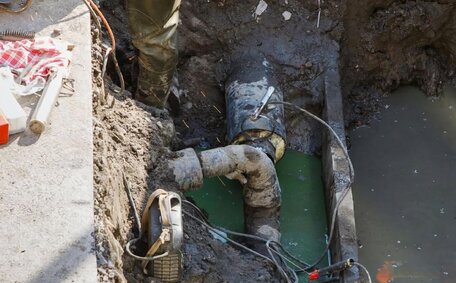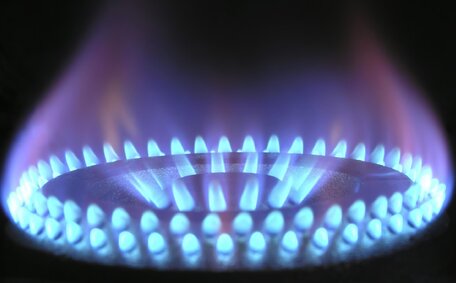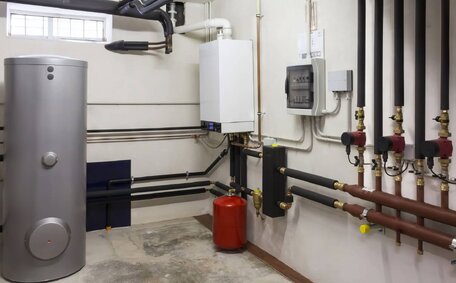
Sump Pump Failure Solutions
Sump pumps fail due to power outages, clogs, frozen pipes, and more. Prevent water damage by understanding causes and contacting plumbers for solutions to extend pump life.
Read MoreCalcium and magnesium buildup in water heaters compromises both flow and water quality. As water heating occurs, these minerals become less soluble and precipitate out onto surfaces. Over time, this leads to lime scale formation, particularly when water high in minerals is involved.
The issue intensifies with hard water, which has higher concentrations of calcium and magnesium. Upon heating, the minerals from hard water precipitate and coat the heater’s pipes, elements, and other parts. This scale buildup gets into the system and makes heat transfer less efficient, lowering hot water output and system lifespan.
Since scale acts as an insulator, it makes the system work harder and consume more energy to heat the water. This increased energy requirement elevates operating expenses. Accumulating mineral deposits narrow the pipes, water lines and tanks, hindering water flow.
If left untreated, scaling can cause issues with heating elements and a multitude of other problems in hot water systems over time:
Descaling your tankless water heater is crucial to avert costly damage from calcium and lime scale. Catching scaling issues early makes removing deposits much easier compared to allowing extensive buildup over a long time of neglect.
A water softener installation is advisable for homes with persistently hard water. Softeners decrease the hardness of water your system encounters by removing minerals that would otherwise go on to form scale in your home. Alternatively, consider scale prevention systems such as template assisted crystallisation.
Safety is crucial when descaling hot water heaters with substantial mineral buildup. Make sure to turn off the power and close the isolation valves, and allow the unit to fully cool before starting. Always follow the manufacturer’s instructions for your specific model.
Below is a guide for descaling tankless units with household vinegar:
How do you handle severe scale? Repeat the process using a stronger acetic acid-based descaling solution. Seek professional assistance if you don’t know how to eradicate persistent deposits in your heater.
Some heaters feature built-in descaling functions, and there are third-party accessories available to automate the procedure. Smart sensors are available too, alarming you about the necessity of descaling water based on chemistry and system data.
Vinegar is generally effective against scale, but its effectiveness can depend on the specific mineral composition of the water. Before you descale your water heater, consider a water test to determine your water quality characteristics.
There are two main approaches for dealing with severely scaled hot water system components - flushing to remove deposits or complete replacement of affected parts.
The initial action on detecting scale buildup is to flush the heater with a suitable cleaning solution. This involves draining vinegar or descaling solution through the tank and pipes to dissolve and flush out mineral deposits. Flushing may be repeated several times to clear blockages.
If scale has seriously damaged components, you may need to either descale or replace parts of tankless units. Heavily corroded anode rods, ruptured tanks, and burned-out heating elements can get replaced if required when descaling comes too late. The heat exchanger in a tankless system is also prone to irreversible damage from untreated scale.
Remember, consistent maintenance can preempt the need for expensive replacements later on. Flushing your system every time a 6-12 months period passes removes scale gradually before it escalates into major blockages, thereby maintaining the efficiency of your system.
So while both flushing and replacement have their place in remedying scale, the best way to prevent it is through periodic descaling accompanied by water softening solutions if hard water is an ongoing issue.
DIY hot water system descaling can be both effective and low-cost when done correctly. However, In certain situations, such as complex setups or severe scale, opt for professional descaling to ensure optimum results.
Benefits of DIY descaling that include servicing your sump pump encompass:
Here are reasons to opt for professional plumbers for descaling:
At Cronulla Plumbing, we provide professional tank, tankless, solar and electric water heater descaling for peace-of-mind effectiveness. Contact our team if your hot water system requires servicing.
Regular flushing of your heater is essential to prevent scale buildup and maintain its performance and longevity.
Manufacturers recommend flushing or descaling heaters at least once year to control mineral deposits before they escalate, ensuring your domestic hot water remains at peak condition. This simple preventative care ensures parts remain scale free inside your heater, improves efficiency, extends lifespan, and avoids costly repairs down the track.
Without frequent descaling, scale invisibly builds up inside the tank and pipes. The small flakes bond and harden over time into thicker layers that become increasingly difficult to remove.
Eventually, major blockages and part failures can occur in your tank, necessitating expensive emergency plumbing callouts or even premature replacement of the entire hot water system.
In contrast, staying on top of scale through annual professional servicing removes deposits gently and gradually. This sustains heating effectiveness, water flow, and integrity of internal components.
Additional benefits of proactive hot water heater maintenance include:
At Cronulla Plumbing, we offer affordable yearly descaling plans to keep hot water systems performing like new. Protect your investment and contact us to schedule hassle-free maintenance.
Keeping your hot water system free of scale is crucial to preserving its functionality and efficiency. To achieve this, consider implementing preventative strategies such as installing a water softener or incorporating a water treatment system.
Water softeners work by Removing all calcium and other minerals such as magnesium through an ion exchange process. This eliminates the root cause of scaling, often caused by calcium carbonate, resulting in clearer, softer water. In turn, the lifespan of your hot water system increases and energy consumption decreases.
Another approach is to use water treatment systems that filter out minerals before they enter the hot water heater. These can be tailored to your specific needs depending on factors such as water hardness levels and existing infrastructure.
Adopting certain lifestyle changes can help minimise the effects of scaling on your system. For instance, using low-flow showerheads and faucets can reduce the volume of water passing through your system, thereby extending the intervals between descaling sessions.
I dont want additional problems, so it’s advisable to perform periodic checks on my hot water heater to catch scaling issues early. This may involve visually inspecting the tank or consulting with a professional plumber like Cronulla Plumbing.
In summary, a combination of installing a water softener or water treatment system, along with practising water-conscious habits, can significantly reduce scaling in your hot water system. Regular checks with a trusted plumbing expert ensure any scaling issues are promptly addressed, preserving the overall health of your system.
Scaling can have a detrimental impact on solar water heaters, causing reduced efficiency and potentially damaging components. As with conventional heaters, mineral buildup impairs heat transfer, causing the system to work harder, especially when water temperature needs to be high.
In the case of solar water heaters, scaling affects the absorber plates, which are responsible for capturing sunlight and converting it into heat. As scale accumulates, it inhibits the ability of these plates to absorb solar energy, thereby compromising the performance of the entire system.
Regular servicing and descaling, following manufacturer’s guidelines, is crucial for optimising the efficiency and lifespan of solar water heaters. Such maintenance often includes draining and cleaning the absorber plates, followed by refilling the system with clean water.
Your tankless water heaters are less prone to scaling than tank models due to the continuous flow of water. However, they are not completely immune to the issue and may require a descaling process occasionally.
Preventative measures for your tankless water heaters include using a scale inhibitor, installing a water softener, or flushing the system annually with a descaling solution. Flushing your tankless water heater involves draining the unit and circulating the descaling solution through the heat exchanger to remove any calcium deposits buildup.
How often you need to descale depends on water hardness and how much you use the heater. As a general rule, units in areas with high mineral content water may require more frequent descaling.
It’s best to call a professional plumber for assistance with descaling your hot water system if:
Here at Cronulla Plumbing, our licenced technicians have the expertise, tools and solutions to tackle tough limescale and get your hot water flowing again.
Our professionals employ industrial-grade descaling solutions customised to your system’s mineral composition for optimal results. This clears even the worst scaling fast while protecting pipes from corrosion.
Our 24/7 plumbing services also include repairs, maintenance plans, tankless water heater installation and more. Rely on our extensive experience with hot water systems for thorough descaling and system improvements.
For prompt assistance descaling your hot water unit, contact Cronulla Plumbing today.
Sump pumps fail due to power outages, clogs, frozen pipes, and more. Prevent water damage by understanding causes and contacting plumbers for solutions to extend pump life.
Read MoreIf your monthly gas bill rises suddenly for no clear reason, the cause could be a gas leak from old pipes or appliances. Contact your provider to investigate.
Read MoreScale buildup reduces the efficiency of hot water systems over time. Regular descaling helps remove this. Flush your system with vinegar or a descaling solution.
Read MoreCronulla, 2230 NSW
We will call back as soon as possible.




